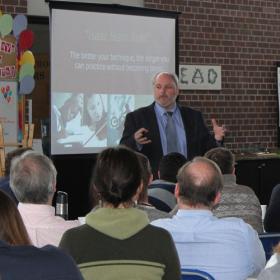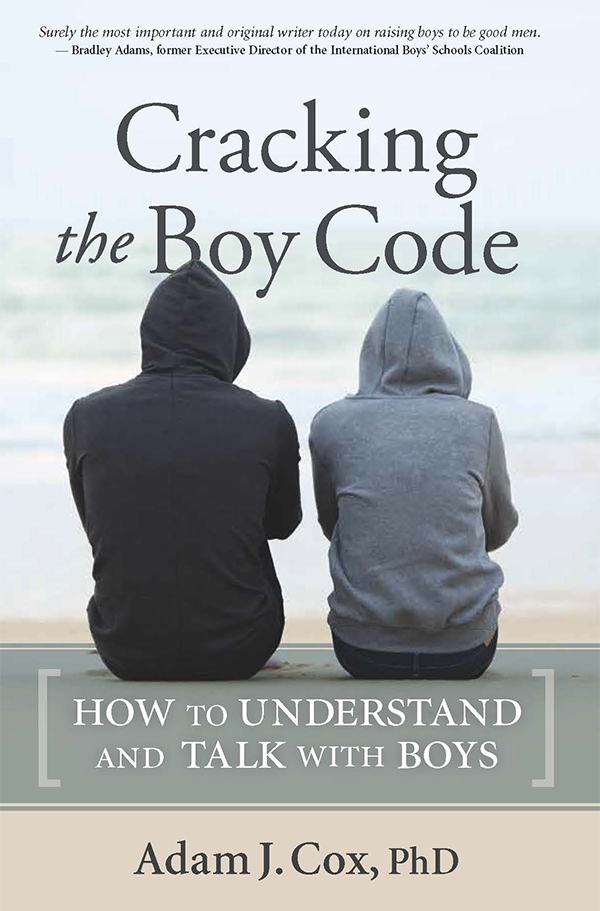 Following are some workshop and keynote lecture descriptions. PLEASE NOTE: These are examples, but not the complete list of available programs. In general, my practice is to speak within my areas of expertise, but focus my material for your specific group and audience.
Following are some workshop and keynote lecture descriptions. PLEASE NOTE: These are examples, but not the complete list of available programs. In general, my practice is to speak within my areas of expertise, but focus my material for your specific group and audience.
(For example, my program on “Communicating with Boys” would differ significantly if it were addressed to elementary school parents, high school teachers, mental health therapists, or a community action program. There are also different versions of the talk for keynote lectures, or a full-day professional development program.)
If you don’t see what you’re looking for, please ask – I may have a program that meets your needs.
Building the Eight Pillars of Capable Young Minds
What is the common thread of capability for students, and what can we do to activate it? This seminar explains how executive functions help students to navigate important developmental hurdles, both social and academic. Special emphasis is placed on the role of working memory, self-monitoring, and cognitive flexibility, particularly as they contribute to helping someone become productive and organized. These important skills also enable problem-solving, goal-directed action, and adjustment in many areas of a child’s life, ultimately leading to increased feelings of self-confidence. Strategies for building and coaching these skills are presented and amply illustrated with examples.
Helping Boys to Communicate and Connect
Drawing on his book, Boys of Few Words: Raising Our Sons to Communicate and Connect, Dr. Cox discusses the challenges so many boys face in learning how to be effective communicators. The obstacles faced by diverse groups of boys, including those who are anxious or shy, angry or resistant, or struggling with neurodevelopmental challenges, are covered in depth. This presentation helps clarify which kinds of communication obstacles grow from a boy’s temperament, and which ones may be related to problems with learning or attention. In all cases, participants are given practical suggestions for reaching out to withdrawn boys or those bound by walls of silence.
**This program is also available in a format that addresses the communication challenges of both genders – Helping Children to Communicate and Connect.
Locating Significance in the Lives of Boys
Drawing upon the results of a two-year global study (United States, Canada, UK, Australia, New Zealand, Singapore, South Africa), Dr. Cox discusses how boys discover a sense of purpose and significance in their lives. This study revealed five major dimensions of significance to boys, all of which are relevant to both schools and families. It provides unparalleled insight into the developmental, educational, and spiritual needs of 21st century boys, and calls for a new paradigm of intervention focused on pragmatic transcendence, real-time achievement, and reframing tradition. Building on the findings of his study, Cox discusses how schools can foster a deeper sense of purpose and significance among boys. He will address critical agents of achievement such as urgency, necessity, and recognition, exploring how schools can build upon existing programs to make them more transformative for boys. Rather than pathologizing the cognitive and behavioral differences frequently found among boys, this presentation emphasizes how to engage those differences in a meaningful way, making school a catalyst for purpose and significance in boys’ lives.
On Purpose Before Twenty
This lecture addresses the challenges so many young people face in becoming effective communicators and full participants in 21st Century Life.
Topics discussed include:
- What is the real purpose of childhood?
- What kinds of opportunities make the biggest difference in growing up happy and strong?
- What do young people expect from their parents?
- What are the greatest fears children have about becoming adults?
Drawing on his extensive research, Dr. Cox will provide insight related to children’s emotions, thoughts and ideals, sharing strategies for developing children’s social skills and ways to initiate relevant conversations. He will also address how young adolescents can develop a sense of purpose and significance in their lives.
The Ecology of Attention
Inattention is an enormous problem for schools and families, yet the origins of this problem are often misunderstood. This workshop covers a variety of strategies and practical interventions to help young minds stay on task. Rather than thinking of inattention as a disorder within a person, for many children and adolescents, it is better understood as a problem between people. When we learn to think about inattention as a function of changing energy levels, we see that inattention has a symbiotic relationship with boredom. The key challenge for teachers and parents is learning how to use meta-cognitive skills to overcome the abyss of boredom and distraction. These skills include understanding the role of physical presence and vocal tone.
Attention is a kind of energy that responds to its environment. We spend far too much time moralizing about inattention, and too little time understanding the practical things schools and families can do to immediately amplify attentional energy. The key to connecting with children and teens prone to inattention is to create an environment that builds an energetic bridge to young minds. We are in the midst of an education/parenting shift that must take into account the tempo and new idiosyncrasies of young minds.
This program offers parents and teachers who work with children and adolescents – with or without learning and attention problems – a new lens for viewing attention. In addition, participants will leave with practical communication strategies, grounded in cutting-edge neuroscience research, that will address the important question, “how do we help children pay attention?”
Unplugged: Relating to Youth in an Age of Electronica
Are your kids always “plugged in”? Do you have problems setting limits with screen time, whether it’s television, texting, or gaming? How much screen time should kids have? Should schools embrace technology, or think twice about becoming “smart” campuses? Are there qualitative differences between online activities? How do we get older teens to “unplug,” if they have legitimate school and social uses for the internet?
In this unique program, Dr. Cox provides practical insight about one of today’s most contentious issues: how our relationship to electronica has changed personal and social relationships, at home and school. How do adults communicate with youth for whom online community seems equivalent, or more engaging, than in-person relationships? What if the parents of your child’s peers are more permissive about texting than you are? What if your teen becomes enraged when you interrupt his gaming? How can teachers compete for ever-shortening attention spans? What if Minecraft seems more important than Middle School to your child? Is it wrong to encourage young children to play with an iPad, if it helps them become computer literate?
This is more than a cautionary program about the potential dangers of screen time, texting, and gaming. Recognizing the positive as well as negative aspects of electronica, this program identifies the underlying psychology and interpersonal issues we must understand to navigate contemporary social life. Rather than merely identifying the problems that can occur when youth become over-involved in technology, Dr. Cox provides realistic benchmarks, and creative, sustainable interventions for parents, teacher, and schools. Please consider hosting a meaningful and productive conversation that will change the way your community thinks about youth, electronica, and culture.
Beyond IQ: Seven Types of Excellence
A metaphorical way of looking at youth’s strengths, this program invites teachers to think creatively about the attributes and potentials of the students in their care, and to consider how their teaching methods and curricula align with the goal of helping students reach their full potential.
Navigators –Have a strong moral compass. They are profoundly attuned to the meaning of events, actions, and words; they inspire strong feelings and reactions in others. Think of the rare child who stands up to defend another against a bully, or your stubbornly Vegan teenager.
Magicians are unconventional thinkers who perceive things differently, sometimes turning a potential deficit (such as a learning difference) into a tangible strength. Think of Temple Grandin, the woman with autism whose understanding of animal behavior stems from her disability.
Sparkplugs are initiators. These passionate, argumentative, and persuasive kids quickly sense what’s new, important, and different – and how to respond. They toggle effectively between “enthusiasm” and planning” mode. Without Sparkplugs, life would be stuck in committee.
Translators are interdisciplinary thinkers. They apply knowledge in innovative ways, and see underlying abstract connections that others miss. These inventive kids often grow up and initiate new technologies.
Locomotives excel at drive and responsibility. Willpower, endurance, and tenacity are trademarks. Think of the kid who shows up at the hockey rink at 5 am to practice without fail.
Rangers are kinesthetic and pragmatic kids who love nature and the outdoors. They are often good with animals and those who communicate differently.
Conductors are socially attuned “people” persons – excellent at relating to, and organizing, others. Conductors have excellent verbal and nonverbal communication. Think politician, grassroots organizer, mediator, or future Oprah.
Other Topics/Programs Include:
Getting to Engagement: Effective Strategies for Communicating with Adolescents
Making Their Mark: Why We Should Encourage Young people to Create
Keys to Motivation and Capability: An Organized Approach to School Success
Helping Children Reach their Highest Potential: A Workshop for Early Childhood Educators
School Assembly Topics:
The Power of the Book
The Meaning of Life Before Twenty
Making Your Mark
What I’ve learned (highlights from global research with boys)
Areas of Expertise include:
Executive Functioning/ADHD
Effective Communication with Children/Teens
Gender Differences in Communication
Adolescent Motivation
Arts in Education
Learning Disabilities/Differences
Gifted Education
Finding Vocation & Purpose
Developing Effective School Programs (Advisory, Social Skills)
Purpose of Education/Building a Wisdom Culture
What Youth Want from Education/Global Study Results
To see a list of some organizations that have hosted my lectures, click here.




